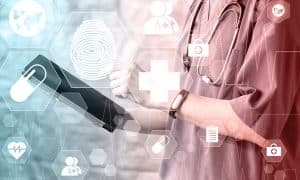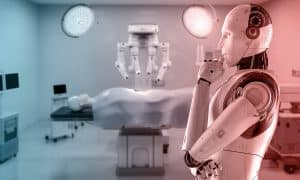Natural Language Processing (NLP) transforms how we interact with technology. It processes human language to unlock vast information potential.
The technology holds the same potential in providing benefits to the healthcare sector. It identifies speech patterns and processes spoken words. This helps clinicians access structured data created during patient care.
This article further explores NLP’s impact on healthcare. Let’s talk about the applications and benefits of NLP in healthcare, from reading patient histories to analyzing research.
The Impact of NLP in Healthcare
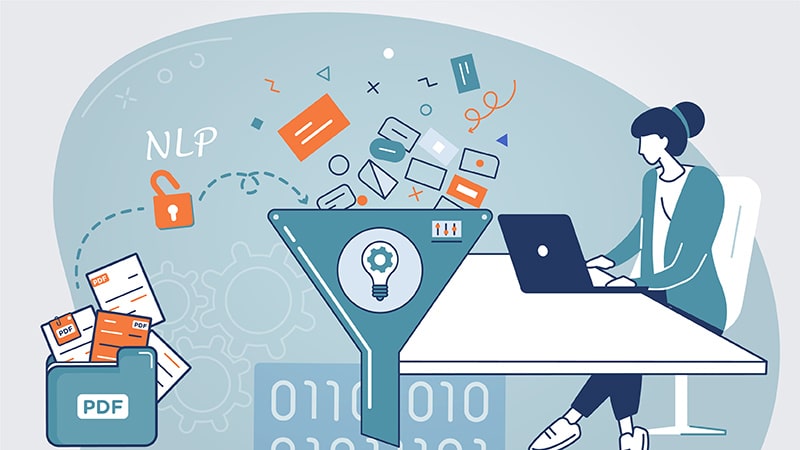
Natural Language Processing (NLP) interprets human language, which helps you turn vast amounts of unstructured data into actionable insights. Its significance in healthcare is vast, from enhancing Electronic Health Records (EHR) to improving clinical trial management and drug discovery. Have a look at the growing potential of clinical NLP in healthcare:
1. NLP in Electronic Health Records (EHR)
EHRs, digital records of a patient’s medical history, are crucial in modern healthcare. They include comprehensive data like medical history, medications, and lab results. Physicians often spend substantial time inputting patient data into EHRs. You’ll often find this data unstructured that computers can’t easily analyze.
Here, NLP plays a critical role. It processes this unstructured data, converting it into a format that’s easy to analyze. This saves physicians’ time and helps in patient classification and condition summarization. NLP enables efficient extraction of insights from EHRs. It can lead to cost savings and facilitate in-depth data analysis.
Applications of NLP in EHR include:
- Information Extraction: It pulls out crucial information from clinical notes, such as diagnoses and symptoms.
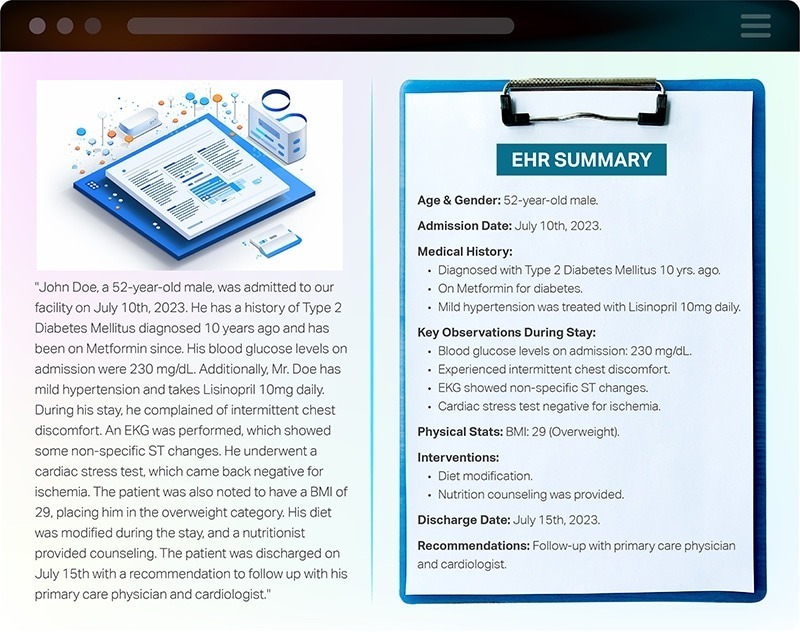
- Enhancing Phenotyping: NLP improves phenotype extraction to help in precision medicine.
- Patient Cohorts Identification: It helps identify suitable patient groups for clinical trials.
- Data Visualization: Tools like CHANL simplify the chart review process. It makes data from narrative notes more accessible.
2. NLP in Clinical Trial Management
The healthcare sector needs clinical trials to evaluate new medical treatments involving complex and costly processes. Much of the unstructured trial data makes patient identification for trials challenging.
NLP automates the patient identification process to simplify this. It applies inclusion/exclusion criteria to EMR data and rapidly pinpoint suitable patients. This significantly cuts down on the time and resources needed for patient selection.
NLP also assists in assessing site suitability for trials by analyzing factors like investigator availability and historical performance. For example, Bristol-Myers Squibb used NLP to stratify patients for heart failure risk in a clinical trial. It shows its potential in optimizing trial processes.
3. NLP in Drug Discovery and Development
In drug discovery, NLP expedites the search for relevant data. It helps uncover unknown chemical reactions and supports experiments based on past results. Transformer architectures in NLP help in understanding chemical structures and predicting molecular interactions.
NLP’s role in drug development includes:
- Gene-Disease Mapping: It rapidly analyzes data to identify disease pathways, crucial for new medicine discovery.
- Adverse Drug Event Detection: NLP outperforms traditional methods in detecting specific adverse events.
- Protein Structure Design: It helps in designing protein structures and predicting their interactions.
4. NLP’s Role in Medical Diagnosis and Procedures
NLP skims through unstructured data to help in patient care and diagnosis. Clinical assertion modeling, a key component of NLP, analyzes clinical notes to determine patient issues and their statuses. This helps physicians prioritize treatment plans.
Notable uses in medical diagnosis include:
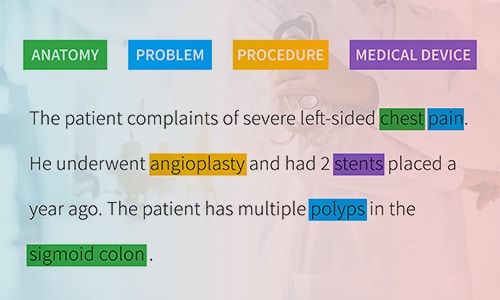 Detecting Clinical Entities: NLP identifies clinical entities such as tests, problems, and treatments in text.
Detecting Clinical Entities: NLP identifies clinical entities such as tests, problems, and treatments in text.- Assertion Status Identification: It determines the presence, absence, or possibility of diagnoses and symptoms.
- Diagnosis and Procedure Detection: NLP identifies diagnoses and procedures in clinical documents. It helps in timely and accurate patient treatment.
- Temporal Relation Detection: Understanding the timing of clinical events is crucial for patient assessment. NLP detects these relations, enhancing the value of EHRs.
Considerations for Leveraging NLP in Healthcare

When implementing NLP in healthcare, you must consider several key factors to ensure its effectiveness and reliability.
- Quality of Data: The accuracy of NLP outputs heavily depends on the quality of input data. Inconsistent, incomplete, or incorrect data can lead to incorrect interpretations. You must use high-quality, standardized data for practical NLP applications.
- Possibility of Error: Like any technology, NLP is not flawless. It may misinterpret nuances in language or miss contextual clues, which may lead to errors. Regular monitoring and validation of NLP outputs are essential to identify and correct such errors.
- Model Training and Updating: NLP models require continuous training and updating to adapt to the evolving medical language and terminologies. Regular updates based on the latest medical research and practices are crucial for maintaining the relevance and accuracy of NLP systems.
- Privacy and Security: Handling sensitive patient data necessitates stringent privacy and security measures. NLP systems must comply with healthcare regulations like HIPAA to ensure data confidentiality and security.
- Integration Challenges: Integrating NLP with existing healthcare systems can be challenging. Seamless integration is vital for efficient workflow and data exchange.
- User Training: Healthcare professionals using NLP tools need adequate training. Understanding how to interpret and apply NLP insights is crucial for maximizing its benefits.
Healthcare organizations can leverage NLP by addressing these considerations that lead to enhanced patient care and operational efficiency.
Conclusion
Natural Language Processing marks a significant advancement in healthcare. It streamlines data processing and enhances patient diagnosis and care. NLP’s applications in EHRs, clinical trials, and drug development are pivotal.
Healthcare professionals must focus on data quality, error minimization, and continuous NLP training to harness its full potential. Adhering to privacy standards and integrating systems efficiently are also crucial. With these practices, NLP will continue to offer improved outcomes and efficiency.


